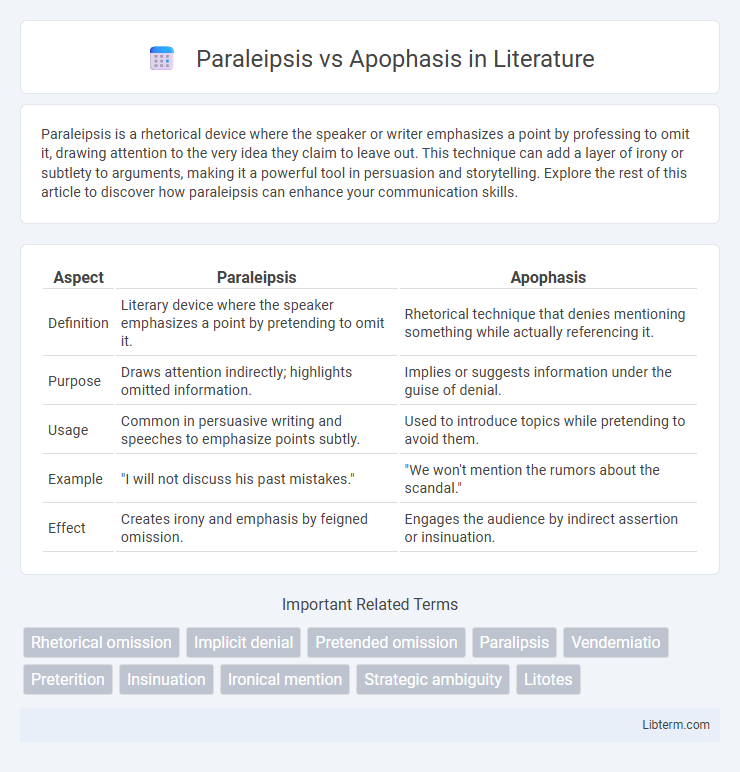Paraleipsis is a rhetorical device where the speaker or writer emphasizes a point by professing to omit it, drawing attention to the very idea they claim to leave out. This technique can add a layer of irony or subtlety to arguments, making it a powerful tool in persuasion and storytelling. Explore the rest of this article to discover how paraleipsis can enhance your communication skills.
Table of Comparison
| Aspect | Paraleipsis | Apophasis |
|---|---|---|
| Definition | Literary device where the speaker emphasizes a point by pretending to omit it. | Rhetorical technique that denies mentioning something while actually referencing it. |
| Purpose | Draws attention indirectly; highlights omitted information. | Implies or suggests information under the guise of denial. |
| Usage | Common in persuasive writing and speeches to emphasize points subtly. | Used to introduce topics while pretending to avoid them. |
| Example | "I will not discuss his past mistakes." | "We won't mention the rumors about the scandal." |
| Effect | Creates irony and emphasis by feigned omission. | Engages the audience by indirect assertion or insinuation. |
Introduction to Paraleipsis and Apophasis
Paraleipsis and apophasis are rhetorical devices used to emphasize a point while pretending to omit it, often enhancing persuasion by implying what is left unsaid. Paraleipsis explicitly states that something will not be mentioned, thereby drawing attention to it indirectly. Apophasis functions similarly by bringing up a subject under the guise of passing over it, creating emphasis through strategic denial.
Defining Paraleipsis: Meaning and Usage
Paraleipsis is a rhetorical device where the speaker or writer brings up a subject by explicitly stating they will not mention it, thereby drawing attention to it indirectly. It functions to emphasize a point while feigning omission, commonly used in persuasive writing and speeches to introduce sensitive or controversial topics discreetly. This technique contrasts with apophasis, which involves denying the intention to discuss something yet simultaneously doing so, making paraleipsis distinct in its strategic understatement.
Understanding Apophasis: Key Features
Apophasis is a rhetorical device where the speaker brings up a subject by stating they will not mention it, implicitly drawing attention to the very topic they claim to avoid. Key features include indirect emphasis, strategic omission, and manipulative suggestion, often used to highlight controversial points without direct assertion. Unlike paraleipsis, which similarly involves saying something by declaring it will be left unsaid, apophasis specifically aims to suggest or imply ideas subtly, enhancing persuasive communication.
Historical Origins of Paraleipsis and Apophasis
Paraleipsis and apophasis both trace their origins to classical rhetoric, emerging as persuasive techniques used by ancient Greek and Roman orators. Paraleipsis involves emphasizing a point by declaring it will not be mentioned, a strategy notably employed by Cicero to subtly highlight accusations without direct statements. Apophasis, rooted in the Greek term meaning "denial" or "negation," was extensively utilized in philosophical and rhetorical contexts to assert ideas by explicitly stating what is not being said, with Aristotle and later Roman rhetoricians advancing its use in argumentation.
Paraleipsis vs Apophasis: Main Differences
Paraleipsis and apophasis are rhetorical devices that involve mentioning something by declaring not to mention it, yet they differ primarily in usage and intent. Paraleipsis typically emphasizes a point by deliberately feigning omission, often to highlight information indirectly. Apophasis focuses on raising a subject while disclaiming discussion, commonly used to introduce a taboo or sensitive topic subtly.
Examples of Paraleipsis in Literature and Speech
Paraleipsis, a rhetorical device where a speaker or writer brings up a subject by denying it or pretending to pass over it, is prominently used in Shakespeare's plays, such as Mark Antony's speech in Julius Caesar: "I am not going to mention his will." Political speeches frequently employ paraleipsis to imply criticism indirectly, exemplified by saying, "I won't even talk about the budget deficit." This technique subtly directs the audience's attention to important issues while maintaining an appearance of restraint.
Notable Uses of Apophasis in Rhetoric
Apophasis, a rhetorical device that involves mentioning something by stating it will not be mentioned, is famously used by Cicero to emphasize accusations while pretending to refrain from doing so. Notable examples include Richard Nixon's "I am not a crook" statement, which draws attention through denial, and Shakespeare's use in *Julius Caesar*, where Brutus claims not to speak of Caesar's ambition while clearly implying it. This strategy creates emphasis and irony, making the implied message more memorable and persuasive compared to straightforward assertion.
Functions and Purposes in Communication
Paraleipsis functions by emphasizing a point while ostensibly omitting it, allowing speakers to highlight sensitive or controversial information indirectly. Apophasis serves the purpose of bringing attention to a subject by explicitly stating that it will not be discussed, creating a paradoxical effect that engages listeners' curiosity. Both rhetorical devices strategically manipulate omission to influence perception and reinforce the speaker's message in persuasive communication.
Common Misconceptions and Overlaps
Paraleipsis and apophasis both involve mentioning something by asserting it will not be mentioned, often causing confusion due to their similar rhetorical functions. Common misconceptions arise when these devices are used interchangeably, though paraleipsis specifically emphasizes deliberate omission to highlight a point, whereas apophasis serves to bring up a topic indirectly while disclaiming responsibility for it. The overlap lies in their strategic use of negation to draw attention, but nuanced differences in intent and context distinguish their rhetorical effects.
Conclusion: Choosing Between Paraleipsis and Apophasis
Paraleipsis emphasizes mentioning a topic by explicitly stating it will not be discussed, creating irony or indirect emphasis, while apophasis highlights a point by pretending to omit it, often to make a subtle criticism or reveal hidden information. Choosing between paraleipsis and apophasis depends on the rhetorical goal: paraleipsis suits scenarios requiring ironic understatement or deflection, whereas apophasis excels at strategic insinuation and veiled assertion. Effective use of these devices hinges on understanding audience perception and the desired impact on argument tone and focus.
Paraleipsis Infographic

 libterm.com
libterm.com